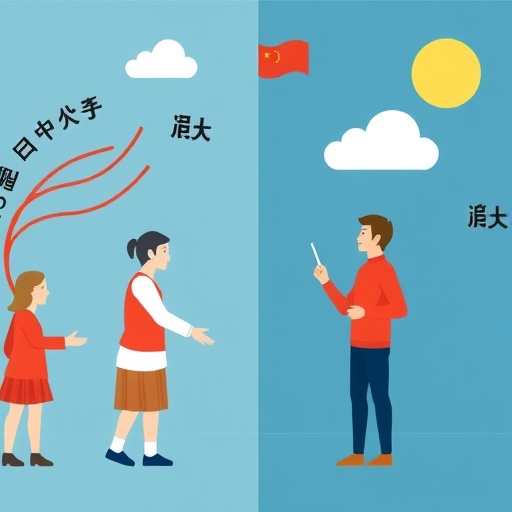In a striking examination of global educational paradigms, recent research by Hu Y. sets out to unravel the complexities that differentiate Confucian schools from Anglo schools. This revelation stems from a comprehensive latent profile analysis based on data from the 2015 Program for International Student Assessment (PISA) and addresses a critical question in the world of education: how do these two distinct educational philosophies shape student learning and outcomes? The study is anticipated to disrupt conventional perceptions about educational effectiveness and provide insights that have profound implications on how different cultures approach the dissemination of knowledge.
The PISA assessment serves as a robust foundation for measuring the academic performance of 15-year-old students across various countries. By juxtaposing Confucian and Anglo educational frameworks, this research goes beyond mere statistical analysis. Hu meticulously delves into the underlying pedagogical philosophies that guide these systems, revealing a dichotomy that influences educational outcomes in significant ways. Confucian schools, rooted in centuries of East Asian tradition, emphasize collective harmony, respect for authority, and a deep-seated value placed on academic achievement. This cultural backdrop inevitably impacts how students engage with learning material, their relationships with peers, and their overall educational experience.
In contrast, Anglo schools tend to champion individuality, critical thinking, and democratic discourse within their learning environments. This divergence in educational philosophy plays a substantial role in shaping not only academic performance but also the social dynamics within the classroom. Hu’s research presents compelling evidence that these innate differences extend beyond mere theory; instead, they have tangible repercussions on student learning outcomes, carrier aspirations, and even emotional well-being. The latent profile analysis undertaken by Hu unveils a nuanced picture of how students from these two educational cultures interact with their environments, teachers, and educational content.
By analyzing the aggregated PISA data, Hu exhibits how performance metrics reveal stark contrasts in student engagement and achievement across the Confucian and Anglo contexts. For instance, students from Confucian backgrounds often demonstrate higher scores in mathematics and reading comprehension. Yet, this success cannot be attributed solely to academic rigor; it also reflects the cultural narratives and expectations that surround educational attainment in these societies. In many Confucian contexts, academic success is not just a personal achievement but a familial and societal obligation. This cultural imperative can drive student performance but may also cultivate an environment steeped in anxiety, as failure can carry substantial social repercussions.
On the opposite end of the spectrum, Anglo students may not mirror these high levels of achievement; however, the emphasis on creativity, exploration, and critical thinking undoubtedly fosters innovative problem-solving skills. These attributes are often heralded as essential in today’s rapidly evolving global job market. Hu’s investigation into these educational paradigms raises provocative questions about the long-term efficacy of both systems. Can a balance between the two philosophies yield better educational outcomes? What lessons can each system learn from the other in a globalized world increasingly defined by cross-cultural interactions?
The findings articulated by Hu also invite a discussion on policy implications. As nations strive to enhance their educational frameworks amidst globalization, understanding the strengths and weaknesses of these contrasting educational ideologies is paramount. For example, policymakers from Confucian societies may look to infuse aspects of creativity and critical thinking inherent in Anglo education to alleviate the pressures of examination-driven philosophies. In contrast, educators in Anglo regions might realize the merit in instilling greater discipline and respect for authority within the classroom, potentially enhancing student focus and academic diligence.
Moreover, the research leads to a deeper contemplation of equity within education systems. Hu underscores the importance of contextualizing educational reforms within cultural frameworks rather than applying one-size-fits-all strategies. The contrast between individualistic and collectivist approaches raises significant questions about the adaptability of educational metrics and assessment tools that are largely derived from Western paradigms. This research serves as a clarion call to rethink how we evaluate educational success, urging an approach that is sensitive to cultural variances and localized strengths.
As educational institutions grapple with the challenges of the twenty-first century, Hu’s findings provide a compelling case for re-envisioning educational practices. By recognizing the rich tapestry of global educational philosophies, educators and policymakers can craft strategies that harness the strengths of both Confucian and Anglo approaches. Emphasizing collaboration across borders may yield a symbiotic educational model that prepares students not only to excel academically but also to thrive within diverse social landscapes.
Moving forward, it is crucial that this dialogue continues within the educational discourse. As more studies emerge, linking cultural philosophy to educational outcomes, educators must maintain a flexible and open-minded stance. Hu’s research sheds light on this dynamic, providing a framework for future inquiries. Analyzing educational practices through the lens of cultural context can potentially redefine success in education, providing a holistic understanding of what it means to educate in an interconnected world.
In conclusion, Hu’s insightful analysis presents an opportunity for stakeholders in the education sector to reconsider traditional notions of success and the systems that promote it. By fostering an environment of cultural exchange and thoughtful policy reform, the global community can contribute to a future where education is not defined solely by grades and test scores but enriches the broader human experience. The implications of this research resonate across continents and cultures, challenging us to embrace educational diversity in our pursuit of a holistic, inclusive, and effective learning environment for all students.
Subject of Research: Differences between Confucian and Anglo educational systems and their impact on student learning outcomes.
Article Title: How do Confucian schools and Anglo schools differ? A latent profile analysis based on PISA 2015.
Article References:
Hu, Y. How do Confucian schools and Anglo schools differ? A latent profile analysis based on PISA 2015.
Large-scale Assess Educ 12, 39 (2024). https://doi.org/10.1186/s40536-024-00225-8
Image Credits: AI Generated
DOI: 10.1186/s40536-024-00225-8
Keywords: Confucian education, Anglo education, PISA 2015, latent profile analysis, global education, educational outcomes, cultural philosophy, student engagement.




